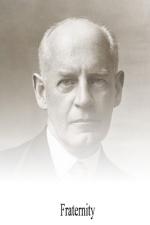“Wouldn’t you rather that I went instead?” “You are wanted; I am not.”
That ice-cold, ice-clear remark contained the pith of the whole matter; and Hilary said:
“You are not going at once?”
“At the end of the week, I think.”
Noting his eyes fixed on her, she added:
“Yes; we’re neither of us looking quite our best.”
“I am sorry.”
“I know you are.”
This had been all. It had been sufficient to bring Hilary once more face to face with the situation.
Its constituent elements remained the same; relative values had much changed. The temptations of St. Anthony were becoming more poignant every hour. He had no “principles” to pit against them: he had merely the inveterate distaste for hurting anybody, and a feeling that if he yielded to his inclination he would be faced ultimately with a worse situation than ever. It was not possible for him to look at the position as Mr. Purcey might have done, if his wife had withdrawn from him and a girl had put herself in his way. Neither hesitation because of the defenceless position of the girl, nor hesitation because of his own future with her, would have troubled Mr. Purcey. He—good man—in his straightforward way, would have only thought about the present—not, indeed, intending to have a future with a young person of that class. Consideration for a wife who had withdrawn from the society of Mr. Purcey would also naturally have been absent from the equation. That Hilary worried over all these questions was the mark of his ‘fin de sieclism.’ And in the meantime the facts demanded a decision.
He had not spoken to this girl since the day of the baby’s funeral, but in that long look from the garden he had in effect said: ’You are drawing me to the only sort of union possible to us!’ And she in effect had answered: ‘Do what you like with me!’
There were other facts, too, to be reckoned with. Hughs would be released to-morrow; the little model would not stop her visits unless forced to; Mr. Stone could not well do without her; Bianca had in effect declared that she was being driven out of her own house. It was this situation which Hilary, seated beneath the bust of Socrates, turned over and over in his mind. Long and painful reflection brought him back continually to the thought that he himself, and not Bianca, had better go away. He was extremely bitter and contemptuous towards himself that he had not done so long ago. He made use of the names Martin had given him. “Hamlet,” “Amateur,” “Invertebrate.” They gave him, unfortunately, little comfort.
In the afternoon he received a visit. Mr. Stone came in with his osier fruit-bag in his hand. He remained standing, and spoke at once.
“Is my daughter happy?”
At this unexpected question Hilary walked over to the fireplace.
“No,” he said at last; “I am afraid she is not.”




